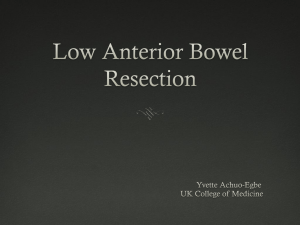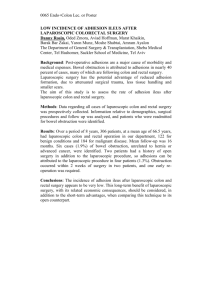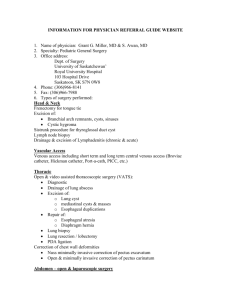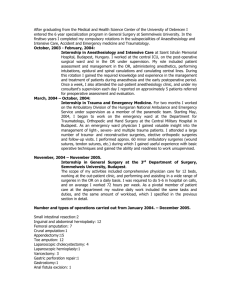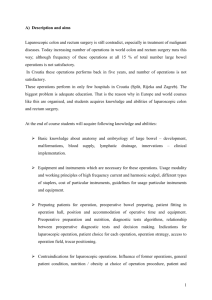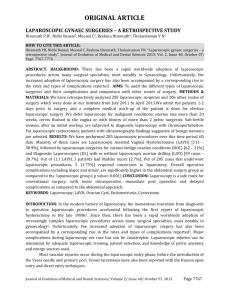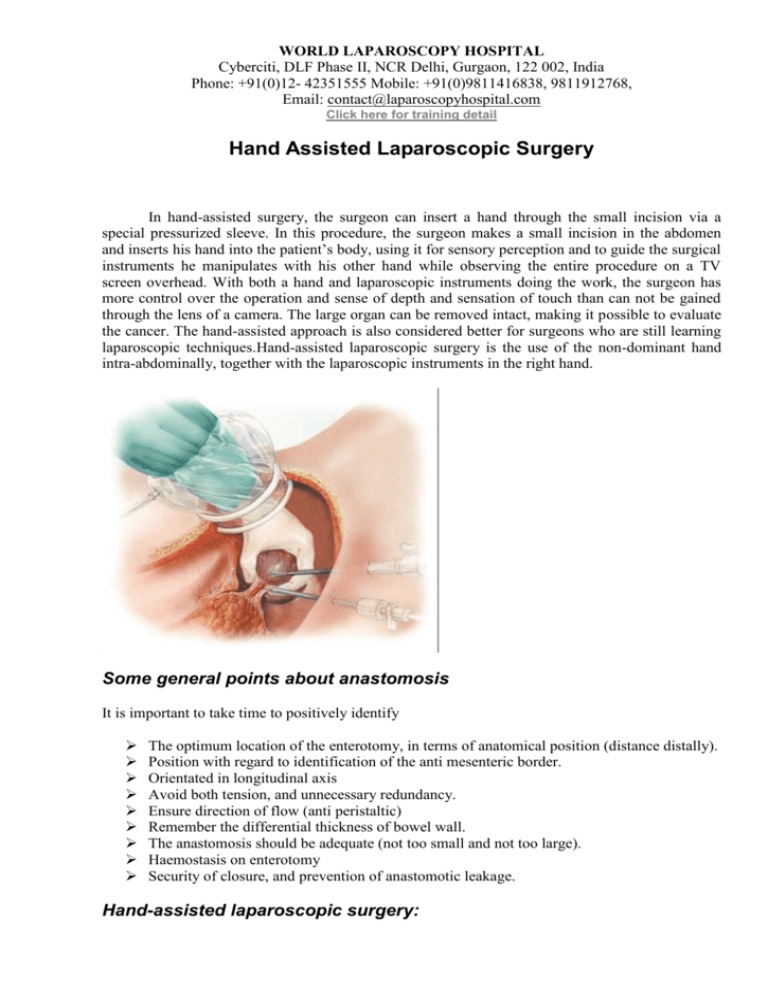
WORLD LAPAROSCOPY HOSPITAL
Cyberciti, DLF Phase II, NCR Delhi, Gurgaon, 122 002, India
Phone: +91(0)12- 42351555 Mobile: +91(0)9811416838, 9811912768,
Email: contact@laparoscopyhospital.com
Click here for training detail
Hand Assisted Laparoscopic Surgery
In hand-assisted surgery, the surgeon can insert a hand through the small incision via a
special pressurized sleeve. In this procedure, the surgeon makes a small incision in the abdomen
and inserts his hand into the patient’s body, using it for sensory perception and to guide the surgical
instruments he manipulates with his other hand while observing the entire procedure on a TV
screen overhead. With both a hand and laparoscopic instruments doing the work, the surgeon has
more control over the operation and sense of depth and sensation of touch than can not be gained
through the lens of a camera. The large organ can be removed intact, making it possible to evaluate
the cancer. The hand-assisted approach is also considered better for surgeons who are still learning
laparoscopic techniques.Hand-assisted laparoscopic surgery is the use of the non-dominant hand
intra-abdominally, together with the laparoscopic instruments in the right hand.
Some general points about anastomosis
It is important to take time to positively identify
The optimum location of the enterotomy, in terms of anatomical position (distance distally).
Position with regard to identification of the anti mesenteric border.
Orientated in longitudinal axis
Avoid both tension, and unnecessary redundancy.
Ensure direction of flow (anti peristaltic)
Remember the differential thickness of bowel wall.
The anastomosis should be adequate (not too small and not too large).
Haemostasis on enterotomy
Security of closure, and prevention of anastomotic leakage.
Hand-assisted laparoscopic surgery:
Hand-assisted laparoscopic surgery (HALS) is the use of the non-dominant hand through a hand
port device. It is an important adjunctive tool with other laparoscopic instruments. The hand port
will be fixed via a mini-laparotomy incision, aiming for a safe maintenance of intra abdominal gas
throughout the operative procedure. The main indication for HALS is in advanced and complex
laparoscopic surgical procedures.
Rationale behind HALS:
Laparoscopic surgery in simple and complex procedures
Disadvantages of total laparoscopic surgery:
1. Loss of direct tactile sensation
2. Hand-eye coordination
3. Instrument changes
4. Conversion rate in complex intra
abdominal procedures.
What is Hand port:
"HandPort(TM)" system allows surgeons the ability to insert a hand into the patient to gain
a tactile sense during laparoscopic surgical procedures. This is a real improvement over previous
techniques which precluded a surgeon from gaining information through touch. Commercially
available to date and approved by the FDA are Dexterity Device, Intromit, Hand port and Omni
port. Omni port has been extensively studied by Europe University, Ninewells Hospital as well as
being clinically applied with success in the repair of abdominal aortic aneurysms in Germany and
USA. Pneumoaccess bubble is one of the great advances by Cuschieri and Shapiro 1995, allowing
complete visual access with the hand inside and pneumoperitoneum safely maintained.
Hand port Devices:
Devices connected to abdomen by adhesive flange:
Dexterity (Inc., Roswell, GA, USA)
Intromit (Medtech Ltd., Dublin, Ireland)
Kissing balloon principle:
Hand port device (Smith-Nephew PLC, London, England)
Single piece devices:
Lapdisc ( Hakko Medical, Tokyo, Japan)
Omniport (Advanced Surgical Concepts Ltd., Dublin, Ire.)
Omniport
Omniport is preferred device because it is:
Single,
Simple component,
Easy to insert,
Comfortable,
Efficient pneumatic seal.
Advantage of HALS:
Pneumo-peritoneum is maintained with Omniport
Indication of HALS:
Hand assisted laparoscopic surgery is a new addition to minimal access surgery. It has a
great potential. Many surgical operations, from the simplest to the very complicated, are greatly
facilitated by the introduction of the hand into the laparoscopic arena. It is therefore purposefully
designed in assisting the surgeon for complex intra-abdominal operation to be done with total
laparoscopy. It stimulated many vascular surgeons throughout the world to reintroduce it into repair
of complex and challenging abdominal vasculature. The Nephrectomy, Splenectomy, Colorectal
surgeries are nicely performed through hand assisted technique.
Advantage of HALS?
•
•
•
•
•
•
Restored tactile feedback.
Preserving the main idea of Minimal Access Surgery (MAS).
A mini-laparotomy hand Port incision.
Reduced conversion rate in total laparoscopy.
Enhanced safety and efficiency allowing the completion of the operation with a hand inside.
Maintenance of the intra-abdominal pressure to facilitate the better view and magnification
of laparoscopic telescope.
• Improving the steep learning curve for inexperienced surgeons.
• Promising reduced cost-benefit ratio
Future Prospect of HALS:
There are general and specific limitations, awaiting multi centre prospective randomized
trials in order to compare HALS in various major intra-abdominal procedures with the traditional
open surgery.
Limitations of HALS?
Limitations can be summarized to:
1. Fatigue,
2. Possible impaired tactile feedback through a lengthy complex procedure and
3. Minor ergonomic restriction is due to the crowdness of the hand with the instruments.
4. Not wells accepted by patient and surgeons because there is already a mini laparotomy.
5. Cosmetically inferior than total laparoscopic surgery.
HALS and Colorectal Surgery
HALS can be used for all major complex abdominal surgeries like:
•
•
•
•
Splenectomy
Nephrectomy
Morbid obesity surgery
Pancreatectomy
•
•
•
•
Nissen fundoplication
Esophagectomy
Rectopexy
Repair of abdominal aortic aneurism
HALS is technically much easier than total laparoscopy in advanced abdominal procedures.
It can help the beginning laparoscopic surgeon to practice such major operations.
Laparoscopic Hand Instruments:
For More Information Contact:
Laparoscopy Hospital
Unit of Shanti Hospital, 8/10 Tilak Nagar, New Delhi, 110018. India.
Phone:
+91(0)11- 25155202
+91(0)9811416838, 9811912768
Email: contact@laparoscopyhospital.com
Copyright © 2001 [Laparoscopyhospital.com]. All rights reserved.
Revised:
.

